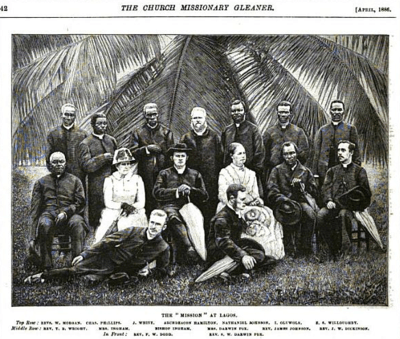James Johnson (minister)
| James "Holy" Johnson | |
|---|---|
| Born |
c. 1836 Sierra Leone |
| Died | 1917 (aged 80–81) |
| Nationality | British Subject, Sierra Leonean, Nigerian |
| Alma mater | Fourah Bay Institution |
| Occupation | Minister and politician |
| Known for | Political activity |
James "Holy" Johnson (c. 1836–1917) was a prominent clergyman and one of the first African members of Nigeria's Legislative Council.[1]
Early life and education
He was born in Sierra Leone in 1836 to liberated African parents of Yoruba origin. Johnson enrolled in a Church Mission Society (CMS) school, then went on to Fourah Bay Institution, located in Freetown, graduating in 1858.
Career

Back row: W. Morgan, Charles Phillips, J. White, Archdeacon Hamilton, Nathaniel Johnson, Isaac Oluwole, R.E. Willoughby
Middle row: Rev. V.S. Wright, Mrs. Ingham, Bishop Ernest Graham Ingham, Mrs. Darwin Fox, Rev. James Johnson, Rev. J.W. Dickinson
Front row: Rev. F.W.Dodd, Rev. W. Darwin Fox
He was a school teacher until 1863, when he entered the ministry.
The CMS was impressed by Johnson's potential, and sent him to its Yoruba mission in Nigeria, first in Lagos and then in Abeokuta. He was unsuccessful as a missionary, perhaps because of his rigid morality, and in 1880 was instead appointed pastor of the Breadfruit Church in Lagos.[1]
When the Lagos Colony was separated from the Gold Coast in 1886, the legislative council of the new colony was composed of four official and three unofficial members. Lagos Colony Governor Alfred Moloney nominated two Africans as unofficial representatives, Johnson and the trader Charles Joseph George.[2]
In 1890, Johnson became assistant Bishop of the Niger Delta and Benin territories, holding this post until his death in 1917.
He believed in a puritan, evangelistic Christianity, but was hostile to other aspects of European culture which he felt were not suitable to Africa.[1]
See also
References
- Notes
- 1 2 3 Lipschutz & Rasmussen 1989, p. 93.
- ↑ Ayandele 1970, p. 164.
- Bibliography
- Ayandele, Emmanuel Ayankanmi (1970). Holy Johnson, Pioneer of African Nationalism, 1836–1917. Routledge (via Google Books). ISBN 978-0-7146-1743-5.
- Lipschutz, Mark R.; Rasmussen, R. Kent (1989). "Johnson, James (Holy Johnson)". Dictionary of African Historical Biography. University of California Press (via Google Books). ISBN 978-0-520-05179-9.